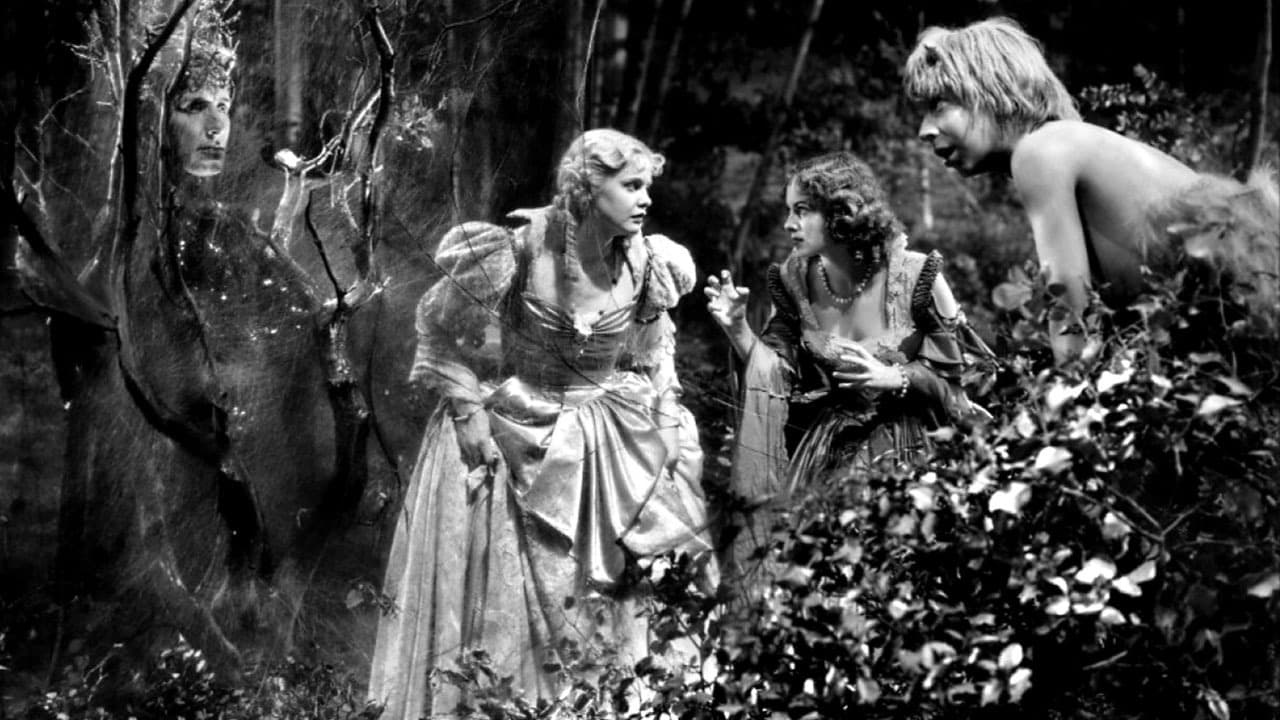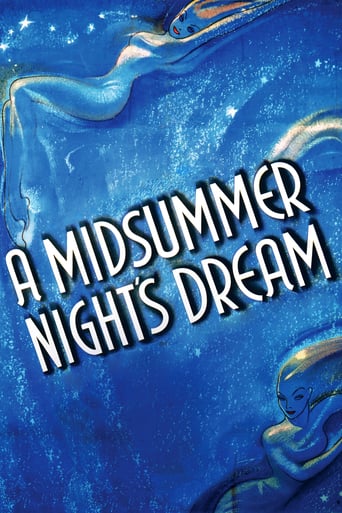

everything you have heard about this movie is true.
... View MoreA Disappointing Continuation
... View MoreIt was OK. I don't see why everyone loves it so much. It wasn't very smart or deep or well-directed.
... View MoreThe movie turns out to be a little better than the average. Starting from a romantic formula often seen in the cinema, it ends in the most predictable (and somewhat bland) way.
... View MoreAll playwrights are confined to the physical restrictions of the stage to bring their works to life. But, surely, in dreaming up their stories, their imaginations are not so constricted. If William Shakespeare had lived to see this movie in 1935, I think he would have said that Max Reinhardt had captured "A Midsummer Night's Dream" on film – just as he had imagined it when penning the play in the 16th century. Indeed, the technical and production achievements in this film -- from the early years of talking movies, are so great that no one has ever made another movie of the story to rival it. And, there have been more than 40 silver screen and TV productions of "A Midsummer Night's Dream" as of the early 21st century. Shakespeare's comedy fable of romance, love, mythology and early stage life comes alive in this film with lavish sets, marvelous costumes, outstanding special effects and superb cinematography, direction, and editing. Of course, this is to take nothing away from a stellar cast that included some of the best actors and up-and-coming performers of the day. The film won two Oscars, for cinematography and best film editing. It was nominated for best picture and best assistant director. Mickey Rooney is fantastic as Puck, the fairy servant to Oberon. Rooney was just 15 when the movie came out, and had been a child actor since age six – appearing in nearly 100 film shorts and pictures before this time. This was the third film of Olivia de Havilland's debut year in Hollywood, and her portrayal of Hermia put her on the road to star status. Bigger name stars of the time gave superb performances. Dick Powell plays Lysander, James Cagney is Bottom, Joe E. Brown is Flute, Victor Jory is Oberon, Ian Hunter is Theseus, Jean Muir is Helena, Grant Mitchell is Egeus, Anita Louise is Titania, and Frank McHugh is Quince. The quality and technical achievements in this film were so great that it was many years before anyone even tried it again, beyond the stage. The first TV movie rendition came 24 years later -- in 1959, and the next silver screen rendition came out in 1968 – 33 years after this films. This 1935 film is the benchmark for Shakespeare's great comedy on the silver screen. It's one that's not likely ever to be equaled or bettered. The bard's comedy is there in any good stage production, but this film adds the wonderment of fantasy. The audience sees the spectacle in the sky with fairies that fly. And nowhere is there a wire to be seen or a support revealed. It's as much fun watching this film for the technical and "magical" aspects as for the story itself.The 2007 Warner Brothers DVD of this film has a "Vintage Featurette" short that IMDb doesn't have in its vast array of all things film and video. "A Dream Comes True – The Making of a Classical Motion Picture" is a Vitaphone short of 1935 that runs seven minutes. It has scenes of celebs attending the Hollywood premiere of "A Midsummer Night's Dream," and background on the making of the movie. To build the giant forest on a huge sound stage, studio technicians roamed the countryside for trees of unusual shapes. They added waterfalls and rivulets for reality, and brought in birds and animals. The short runs through the casting selection of 20 prominent actors cast in lead roles. Rex Reinhardt, the renowned stage producer and director had put the play on in the Hollywood Bowl the year before. It was a huge success, and Warner Brothers signed him to produce and direct the movie. Reinhardt brought Wolfgang Korngold from Vienna to arrange the music by Felix Mendelssohn for the film. The electricity for the lighting needed to illuminate the huge forest and set was enough to run a small city. It created a great deal of heat on the set, and the cast "melted" under their heavy costumes. The short shows performers cooling off in front of a giant fan, while Dick Powell treats the children fairies to double-scoop ice cream cones.
... View MoreHad never seen a production of 'A Midsummer Night's Dream" and so it's hard to judge if this Warner Bros. production is a good representation or not. I have to say I found it very enjoyable, and Hollywood certainly pulled out all the stops at their disposal. The actors all seemed competent, especially James Cagney and Olivia DeHavilland as Bottom and Hermia respectively. Less good were Dick Powell as Lysander and Hugh Herbert as Snout, particularly the latter. Herbert added nothing to the show except his patented giggle which became irritating after a while. A big surprise was Ross Alexander as Demetrius, who was very much at ease in the role. Too bad he didn't become a big star.Saving my best comments for last, as I enjoyed Mickey Rooney's portrayal of Puck immensely. I always consider him one of the most talented people Hollywood has ever produced; he could sing and dance as well as act. I felt he was the star of this film and was an arresting presence whenever he was on screen, confident of his ability and trying mightily to give his best. And he succeeded. Too bad this was produced before Technicolor came into being; it could have added so much more.
... View MoreIt's a maddening movie, hard to get a handle on. On one hand, there's the Anglo world's leading playwrite, Shakespeare, along with the glorious strains of Mendelsohn; on another, there're a bunch of Hollywood contract players who made their bones as gangsters or low comedy relief. Add a wild card of downright ethereal imagination, and you've got a movie like no other. I can see why the two hours and more failed at the box-office. After all, how many movie-goers want Shakespeare with their gun-toting Cagney, even if he does well. Then too, two hours of poetic dialog, along with goofy mugging, can strain more than just the backside. Frankly, I fast-forwarded through some of the mugging passages. But what kept me going were those ethereal passages, especially the early ones. Now ordinarily, I'm not too much on fairies, nymphs or wood sprites. But the sight of those wispy creatures snaking up beams of light and into some nether world is darn near as good as Randolph Scott striding down a lawless street. In fact, it may be even better, certainly more exotic. Whoever staged those unearthly scenes deserves an Oscar of superlative design. Anyhow, I'm in no position to really judge the film since I wouldn't know Shakespeare from Albert Einstein. But I do know that visual imagination doesn't come anymore striking. And if the beams preview a stairway to the Pearly Gates, then count me in, even if I have to put down my beer bottle.
... View MoreI bought this movie because I want to see as many Joe E. Brown movies as possible. Joe, and other Warner Brother's actors/actresses, didn't want to make this movie because they were not getting paid to act in it. Instead of cash, Joe was allowed to take the afternoon off any time he wanted to go to the races. That was his payment for his participation in the movie. Joe played the flute player. In the version of the video I saw, there was no scene in which he played the flute. Joe also was forced to dress like a woman and play a female part in the play. He did it reluctantly but it horrified him when a critic implied that he was a female impersonator. Joe said "I was shocked, horrified, and embarrassed when I was taken for a female impersonator."
... View More